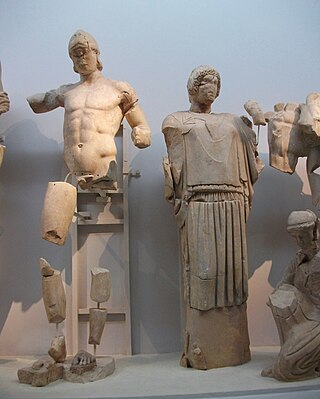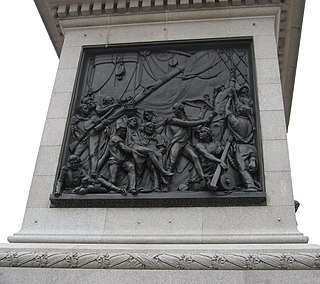Related Research Articles

In Greek mythology, Pelops was king of Pisa in the Peloponnesus region. He was the son of Tantalus and the father of Atreus.

Hippodamia was a Greek mythological figure. She was the queen of Pisa and the wife of Pelops, appearing with Pelops at a potential cult site in Ancient Olympia.
Alcathous was the name of several people in Greek mythology:
William Carew Hazlitt, known professionally as W. Carew Hazlitt, was an English lawyer, bibliographer, editor and writer. He was the son of the barrister and registrar William Hazlitt, a grandson of the essayist and critic William Hazlitt, and a great-grandson of the Unitarian minister and author William Hazlitt. William Carew Hazlitt was educated at the Merchant Taylors' School and was called to the bar of the Inner Temple in 1861.

The Greek Anthology is a collection of poems, mostly epigrams, that span the Classical and Byzantine periods of Greek literature. Most of the material of the Greek Anthology comes from two manuscripts, the Palatine Anthology of the 10th century and the Anthology of Planudes of the 14th century.

Henry Constable was an English poet, known particularly for Diana, one of the first English sonnet sequences. In 1591 he converted to Catholicism, and lived in exile on the continent for some years. He returned to England at the accession of King James, but was soon a prisoner in the Tower and in the Fleet. He died an exile at Liège in 1613.

Humphrey de Bohun, 7th Earl of Hereford, 6th Earl of Essex, 2nd Earl of Northampton, KG was the son of William de Bohun, 1st Earl of Northampton, and Elizabeth de Badlesmere, and grandson of Humphrey de Bohun, 3rd Earl of Hereford, by Elizabeth of Rhuddlan, daughter of King Edward I. He became heir to the Earldom of Hereford after the death of his childless uncle Humphrey de Bohun, 6th Earl of Hereford.
This is an incomplete list of people who have served as Lord Lieutenant of Warwickshire. Since 1728, all Lord Lieutenants have also been Custos Rotulorum of Warwickshire.

John Edward Carew was a notable Irish sculptor during the 19th century. His most prominent work is The Death of Nelson, one of the four bronze panels on the pedestal of Nelson's Column in Trafalgar Square.

James Compton, 3rd Earl of Northampton FRS, was an English peer, politician and author, who fought for the Royalists during the First English Civil War.
Mathew Roydon was an English poet associated with the School of Night group of poets and writers.

William Winstanley was an English poet and compiler of biographies.
Henry Huth (1815–1878) was an English merchant banker and prominent bibliophile.
William Barksted was an English actor and poet.
Thomas Beedome was an English poet. He appears to have died at an early age, and of his life nothing is known.
Thomas Rogers was an English Anglican clergyman, known as a theologian, controversialist and translator.
James Wright (1643–1713), was an antiquary and writer, author of a county history of Rutland (1684), and the Historia Histrionica (1699), an account of theatre in England in the seventeenth century.
In Greek mythology, Hippodamia,Hippodamea or Hippodameia may refer to these female characters:
Robert Codrington (c.1602–c.1665) was an English author, known as a translator.

Beaufort House was a grand mansion built beside the River Thames at Chelsea, London, by Thomas More in about 1520, while he held the position of Lord High Chancellor of England to King Henry VIII. On his arrest in 1534 all of More's property was forfeit to the Crown. The house was given the name of Beaufort House only in 1682, when it passed into the hands of the 1st Duke of Beaufort. It was demolished in 1740, giving its name to present-day Beaufort Street.
References
- ↑ William Carew Hazlitt, Handbook to the Popular, Poetical and Dramatic Literature of Great Britain p. 246[ full citation needed ]
![]() This article incorporates text from a publication now in the public domain : "Grove, Mathew". Dictionary of National Biography . London: Smith, Elder & Co. 1885–1900.
This article incorporates text from a publication now in the public domain : "Grove, Mathew". Dictionary of National Biography . London: Smith, Elder & Co. 1885–1900.